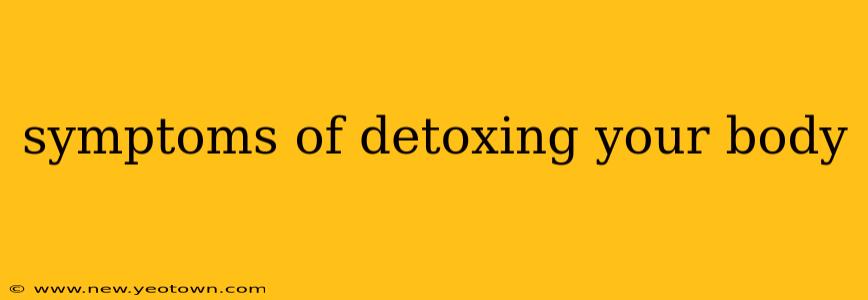We've all heard about detoxing – the idea of ridding our bodies of harmful toxins and impurities. But what does it actually feel like? The truth is, detoxing isn't a singular event, but rather a continuous process our bodies undertake naturally. However, when we intentionally support this process – through diet changes, exercise, or other methods – we might experience a range of symptoms. These aren't necessarily signs of something going wrong, but rather the body's way of adapting and eliminating waste. Let's explore the common symptoms and what they might mean.
What are the common symptoms of detoxing?
The symptoms of detoxing can vary greatly depending on the individual, the method used, and the type and amount of toxins being eliminated. However, some common experiences include:
- Headaches: As your body works to flush out toxins, it can sometimes cause headaches. This is often linked to dehydration or changes in blood sugar levels.
- Fatigue: Feeling tired is another common symptom. Your body is working hard to cleanse itself, which can be energy-intensive.
- Muscle aches and pains: As toxins are released, they can sometimes cause inflammation and discomfort in the muscles.
- Nausea and digestive upset: Your digestive system plays a crucial role in detoxification. Changes in diet during a detox can lead to temporary digestive issues like nausea, bloating, or changes in bowel movements (diarrhea or constipation).
- Skin changes: Your skin is a major organ of elimination. During a detox, you might experience breakouts, rashes, or increased sweating as toxins are expelled.
- Increased thirst: Your body needs more fluids to help flush out toxins, leading to increased thirst.
- Changes in mood: Some people report experiencing emotional shifts during a detox, such as irritability, anxiety, or mood swings. This is often attributed to hormonal fluctuations as the body adjusts.
- Sleep disturbances: Detoxing can sometimes affect sleep patterns, leading to insomnia or more vivid dreams.
Is it normal to have these symptoms during a detox?
Yes, many of the symptoms listed above are considered normal, especially when embarking on a more intense detox program. The intensity and duration of symptoms vary significantly from person to person. It's crucial to remember that these symptoms are usually temporary and will subside as your body adjusts.
How long do detox symptoms last?
The duration of detox symptoms varies considerably depending on factors like the intensity of the detox program, individual health status, and the type and amount of toxins being eliminated. Symptoms typically last from a few days to a couple of weeks. If symptoms persist for longer or are severe, it's essential to consult a healthcare professional.
What to do if you experience severe detox symptoms?
While mild symptoms are often expected, severe or persistent symptoms require attention. If you experience intense nausea, vomiting, severe headaches, or other concerning symptoms, consult a doctor immediately. They can help determine the cause and provide appropriate treatment.
What are the best ways to support your body during a detox?
Supporting your body during a detox involves:
- Hydration: Drink plenty of water throughout the day to help flush out toxins.
- Nutrition: Focus on a diet rich in fruits, vegetables, and whole grains.
- Rest: Give your body adequate rest to support the detoxification process.
- Exercise: Gentle exercise, like walking or yoga, can also support detoxification.
Remember, detoxification is a complex process, and it's always best to consult with a healthcare professional before starting any detox program, especially if you have underlying health conditions. This article is intended for informational purposes only and does not constitute medical advice.

